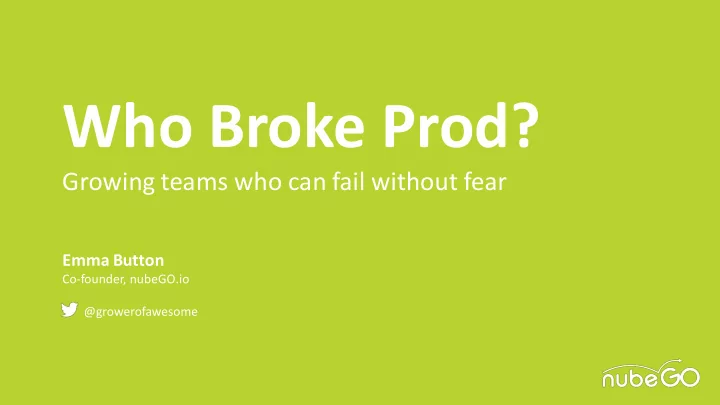

Who Broke Prod? Growing teams who can fail without fear Emma Button Co-founder, nubeGO.io @growerofawesome
BAD STUFF HAPPENS
SELF-DEFENCE Respond positively to feedback Stop seeking blame Photo: Silvia Izquierdo
Improvem ement t Kata tas – Respon ondin ing to to Failu lure SELF-DEFENCE Resilience • Re-live a painful failure. Find one new way of responding in a painful situation, write it down and consciously choose to use that response next time • Respond with “ Thank you for the feedback” Stop Seeking Blame • Correct yourself and others when we find ourselves asking “Who is to blame for this?” or “What caused this to happen?” – replay the question as “What are the factors that contributed to the failure?” • Periodically remind ourselves, our peers and our team “It’s OK to fail”
INCIDENT Brutal transparency Collaboration & Shared Accountability
Improvem ement t Kata tas – Incid nciden ent t Respon onse INCIDENT Transparency • Use Slack to share and keep a quick, lightweight, internal record of all actions we take, record our assumptions Collaboration & Shared Accountability • Practice Pair-Incident-Management • Pair when formulating customer-facing responses • Pair when diagnosing logs & metrics • Pair when applying changes • Get into the habit of using the word “We” instead of They/I/You/Them
POST-MORTEM Blameless Post-Mortem Learning Review Beyond Blame; Learning from Failure and Success by Dave Zwieback
POST-MORTEM Improvem ement t Kata tas – Blamel eles ess Post-Mor ortem em Do them!
VISIBILITY Make failure visible Know your normal
Improvem ement t Kata tas – Make e Fail ilure e Visib ible le VISIBILITY Visualise Failure • Install an information radiator. Put the results of your CI/CD pipeline onto the screen somewhere that everyone can see. Know Your Normal • Draw a flow map of data as it travels through your system on a big wall or whiteboard.
EXPERIMENT Make time for experiments Try things you DO NOT know Practice game days
Never punish people for trying REWARD Reward positive behaviours Change starts with US
Improvem ement t Kata tas – Reward, don’t Punish Re-enforce Blameless Behaviours REWARD • At least twice a week, make a point of publicly singing people’s praises for demonstrating behaviours that support:- • Experimentation • Collaboration • Accountability • Go for lunch as a team to celebrate a honest, but difficult retrospective Reward, Don’t Punish • Practice using supportive language: • Say “thank - you” to someone who shares their account of what happened • Say “well done” to someone who tries a new approach to solve a problem, whether or not it works • Tell someone their honesty in a post-mortem is appreciated • Reward honest and blameless contribution to post-mortem with a gift - laptop stickers
Emma Button emma@emmabutton.co.uk linkedin.com/in/emma-button @growerofawesome
Recommend
More recommend